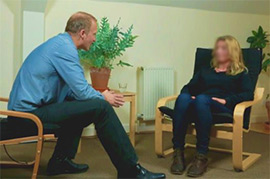
A feeling that the very person who should support and believe and help you just doesn't care, or believes what it suits them to believe, can lead to a sense of aching irresolution.
What do you do when a client feels betrayed by a parent who denies knowledge of, disbelieves, or even has no interest in, their adult child’s account of having been sexually abused?
This was a question on a recent Uncommon Practitioners Q&A call. And it’s a good question.
Why would a parent deny or even refuse to countenance the possibility that their son or daughter was abused?
Well, in the case cited by my questioner – and you can listen to the segment and my reply below – the alleged abuser was a friend of the client’s mother. Maybe the mother felt a sense of loyalty to her friend, maybe she just couldn’t believe the person could be an abuser… or maybe she refuses to go anywhere near the possibility that she herself bears any responsibility. Who knows what’s in her head? But I have seen this pattern play out quite often with different clients over the years.
Parental denial can be a huge problem for the person who was abused. A sense of betrayal. A feeling that the very person who should support and believe and help you just doesn’t care, or believes what it suits them to believe. This can lead to a sense of aching irresolution.
But some people’s hearts seem to be made of stone (at least where some things are concerned) and, to add another well-worn metaphor, you can’t get blood out of a stone. We can’t get from someone something they do not have within their capacity to give us, no matter how much they should give it to us.
The pain of going round and round
Constantly ruminating about a major issue that just cannot be resolved immediately, for many years, or perhaps ever, is exhausting and depressing.1
So what’s left if we can’t make people recognize or acknowledge what we feel we need them to acknowledge? How can resolution happen? Well, when we can’t change a situation (that is, having genuinely established that we can’t, for now, change it), all that’s left is to change our take on it. We resolve something in one of two ways. Either we:
- practically solve the problem, or
- stop worrying about it in the same way so that it fades from our minds.
I’m not for a moment suggesting that adult surviviors of sexual abuse shouldn’t feel entitled to have their parent acknowledge what happened. But if that’s simply not going to happen, then we need to look at other ways to help them find fulfilment and peace of mind in life.
Anyway, you can listen to my take on this in the Q&A session, or read the transcript below. It is by no means necessarily a complete answer to such a thorny question, but it may offer a few ideas – not least of all the use of metaphor.
Question
I have a client who experienced sexual abuse in their early teens via a friend of their mother. They told the mother at the time but were not believed. Now an adult, my client feels they have processed the abuse but struggles to let go of their mother being unable to acknowledge what happened. My client has attempted on several occasions as an adult to address this, but the mother diminishes my client’s experience and won’t discuss it. Ideas please! Thank you!
Listen to Mark’s answer or read below
Hear the answer by clicking the play button below:
Or click here to download the clip to play later (you may need to right-click and select ‘Save As…’ or tap and hold)
Answer transcript
This can be quite a common pattern we sometimes see in our clients, in which an emotional loop remains unfulfilled. Often the primary emotion becomes anger, alternating with perhaps feelings of hopelessness or despondency, because you’re not getting what you need or what you needed.
And certainly that’s how it feels – someone needed or needs something from someone else who doesn’t or didn’t give it to them, and yet they still crave it. So you’re in this double-bind, a catch-22 where you want something from someone but they’re not prepared to give it, or they can’t give it to you because it’s not within their capacity to give it to you. And often it might be a parent or partner who hasn’t given us what they should have given us in terms of love or support or recognition. And not surprisingly, then we can feel resentful or angry or depressed because of that – we expect it, and we’re not getting it.
So there’s a feeling of unresolved-ness, a sense of “what was rightfully mine hasn’t been given to me”, hence the anger and other feelings often coupled with these sorts of situations. And also a feeling of betrayal of course, having felt that the very person who should have been there to protect you, or at least believe you, or at least countenance your point of view, didn’t do any of those things.
So we quite clearly see why this is an issue for people, and there’s two ways of solving it. Either we get the person to somehow see that they should acknowledge this, but that’s not always very easy. And certainly writing to the person and so forth hoping that they’ll read what you’ve written is something that quite often people try to do, but it’s not always the way to go. For example, we might make someone apologize, but we can’t make them mean the apology. It’s like when you say to a kid, “Apologise! Now say it again with meaning, I want you to mean the apology, don’t just say it in a sarcastic way!” Because you can say sorry in about 60 different ways!
Of course, the world doesn’t always bend to our will. I would ask this client what would actually make it right for her. What would her mother have to do in order to make it right, does she think? What are someone’s expectations in this? What would her mother have to hypothetically say or do to make it right for her? In detail, what would it have to look like, and would it really make a difference? It might do. How would she finally know her mother had acknowledged what had happened to her and wasn’t just paying lip service, for example? How would she know it was genuine? And so forth. Presumably her mother knows what happened to her, or at least knows what she says happened to her if she doesn’t believe her, so at least she has some sort of cognition about this.
You could also ask your client what she would need to feel better without her mother formally acknowledging what happened back then. Let’s put that off the table for the time being. You know, you can go up to anyone in the street and ask for a million dollars, but if it’s beyond their capacity to give it to you then you ain’t gonna get it.
If this doesn’t happen, in what ways in life can you feel better? Not everything needs to be contingent on this one thing. So often we think that only x, y, or z would make us feel better. So we narrow things down – and not surprisingly, in this case – but it can be useful to think about… okay, if I don’t get what I’ve designated as essential for me, what would help me be fulfilled despite not getting that? And to really think about that.
Is it possible for us to compartmentalize hurts in our life and still have a good life? “That’s over here, that’s away there, but I’ve still got all of this that I can focus on.” And that doesn’t make it right, it doesn’t make what the person did to her, of course, and the mother’s reaction to that right either, but sometimes we can’t bend everything to our will. (And I wouldn’t necessarily put it in those terms to her!)
But maybe the mother is amenable to improving the relationship with her daughter. Maybe the mother would even come and see you as a client alongside the daughter, I don’t know, it doesn’t sound very likely. But ultimately it might be that the mother is unbendable in this way, in which case your client will need to move on from trying to get something from someone who just doesn’t have it to give.
Certainly using metaphor can be useful. I remember watching a movie called Smoke with Harvey Keitel and William Hurt back in the ’90s (I might be telling this completely wrong because it’s a long time since I saw it). William Hurt is a writer, and his life is saved by this young 17-year-old guy who’s kind of on the streets, and they become friends and William Hurt looks after him. And this young guy is very hurt by the fact that his father, played by Forest Whitaker (it’s all coming back to me!), is kind of estranged from him and doesn’t have anything to do with him. And he goes to see him, and it all goes wrong, and it’s terrible, and he’s very depressed about this.
And then at one point in the film, William Hurt does a wonderful piece of therapy which I thought was a great piece of filmmaking, and he says [something along these lines], “Oh, you know, I was reading an account in the paper about this explorer, this young man with a young family, young son and wife at home, and he goes off exploring in the Arctic somewhere and he gets lost and he never returns. And it’s a mystery to everybody what happened to him, he’s never seen again. Then his son grows up and he becomes an explorer in turn. And he goes out onto the tundra, the icy wastes, and they’re sitting down, having a rest at some point, and the wind blows and uncovers these bodies, and they’re perfectly preserved, these frozen bodies from a very long ago expedition that are still there. And he suddenly recognizes his own father from photos, he realizes it’s his own father, and it’s a very weird thing for him to suddenly see that he now is much older than his own father.”
And William Hurt looks at this young boy and nothing more is said. It’s a very subtle piece of filmmaking, but after that point the young boy seems to blossom a little bit more, and the metaphor has taken root, even if he wasn’t consciously aware of it, that he now is more of a man, more of an adult, than his own father.
So, certainly using metaphor with cases like this can be useful as well.
Learn how to lift trauma fast with Mark Tyrrell
Given the horror that post-traumatic stress disorder can inflict on lives, the idea that it can be resolved quickly can be hard to believe. But when you consider how quickly PTSD can be caused in the first place, it starts to seem a more reasonable proposition. For more on how to resolve single cause trauma in a single session, read about our online trauma treatment course here.
Notes:






